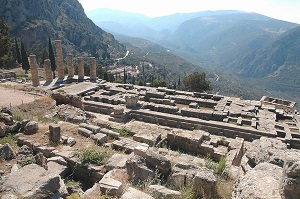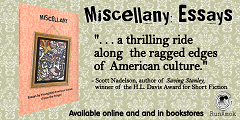Sober Apollo
The Greeks knew human nature well, deifying the characteristics most archetypal to the human experience. They flocked to Apollo’s shrine at Delphi, believing this to be the clearest channel to commune with the divine.

A depiction of the Shrine at Delphi by Giovanni Ruggiero. The Greeks worshiped reason.
Apollo was synonymous with rationality and temperance. The phrases mēden agan meaning “Nothing in Excess” and gnōthi sauton meaning “Know Yourself” were inscribed on the black marbled exterior of his sanctuary. To the Greeks, this was the center of the earth and therefore nearest to Mount Olympus and the holy. Apollo became the patron god of healing, truth, and poetry. Zeus’ golden child. But Zeus had other sons.
Dionysus watched over his big brother Apollo’s temple for three months a year, replacing reason and balance with the intoxicated ecstasy and chaotic revelry of the unconscious.

What remains of Apollo’s temple. Likely ruined when his impetuous brother Dionysus was in charge.
Dionysus practiced a surrender to emotion and pleasure, becoming the god of the vine, the grape-crusher. His followers connected to him through the wild improvisation of dance and song, yielding to the raptures of sensuality. Dionysus and Apollo were both patrons of the arts and chief conductors between flesh and spirit. They only went about it differently.
The mind of the alcoholic is the shrine at Delphi.
The majority of the time, it houses clear-minded rationality. When sober, alcoholics are known to be driven, willful, and gritty. But, like our western version of the Apollonian-Dionysian split—Dr. Jekyll and Mr. Hyde—the alcoholic hides a dark oblivion from himself.
Our Apollo is obsessed with Dionysus. The more our rational brain tightens the reins, the more powerful the kicks of a wild horse bucking to be free. The mixture of a dueling persona—the impulsive Dionysus and the reasoning Apollo—creates an obscure balance in the alcoholic. He verifies falsehood. He falls down the stairs in a stupor and reasons that the railing was loose. He cannot know himself. Denial comes in many forms, but it is certainly not a river in Egypt.
We’ve invested our cultural capital in Dionysus.
Western romance is fraught with the conflict inherent in quenching the uncontrollable urge, as in Edgar Allan Poe’s characters, Stevenson’s Edward Hyde, or the life examples of F. Scott Fitzgerald, James Joyce, and Jack Kerouac.
We associate creative brilliance with tragic self-destruction, as if the only ticket to godliness is a deal with the devil. Contemporary pop culture is a polluted conversion of the Dionysian freedom from inhibition. A few turns of the radio fill the imagination with the urge to succumb to pleasures not for communion, but for the sake of succumbing to pleasure. Dionysus was more than a hedonist.
It makes one wonder if space will clear again in the arts for the sober Apollo.
 Previous Post
Previous Post Next Post
Next Post












What a great metaphor Mark. <3
Diana xo
Captivating stuff here, Mark.
I think the lead up to the final question is interesting in that the struggle for balance you talk about in we alcoholics is in all of us. The dark side is often drawn upon in the arts (no pun intended), and can be a big part of many artist’s work. I am sure whole books have been written about this, but I imagine we tend to focus more on the darker side of things because part of us fears and reveres it at the same time.
We (now sober) writers have all, at some point, have looked towards the Bukowski’s of the world and fetishized them. I know I did at least. There was something about that picked at that part in us which wanted to be expressed. I think though that there is a ton of space for the Apollo. I think that there is a place between rational and impulsive where they can serve one another. The idea that we need be one or the other is limiting. I think that the more “successful” (in terms of creative expression) artists are the ones who can harness that bucking horse in a way that is still controlled in some way.
Anyway, I may be rambling here, but you bring something up that I think we have all struggled with, and probably do still subconsciously.
Fantastic post.
Paul
Thanks Paul. It’s funny. True to form, I didn’t really consider the middle ground while writing this. You are a middle-ground warrior my friend. Meaning, you see your bent on extremes and fight hard to maintain that tentative place between them.
I’m the same, or try to be. Hence the whole “miracle of the mundane” thing. We can have our revelry and intoxicated freedom from inhibition while Apollo and his reason are on the watch. Funny, it just didn’t cross my mind.
For what it’s worth, I do feel as though we are pushing an Apollonian movement here. We are driving this thing forward. And while I’m sure there are others taking part, we are a part of something happening here that is much bigger than ourselves and will be noted on the sliding trends of literary history. But there I go. Getting all grandiose again. I appreciate your read and reflection, as always. Just read your latest, which was boom! pow! stuff, of course.
Oh Mark…..this was deep. Lol Almost too much for this old gal to grasp…but I’m here cheering you on! Lol
This was interesting!
xo
Wendy
Very interesting. I hope to see more like this in the future.
Thank you Mae. It was itching to be written for a while…then I did the research and it all came together. If you liked that one, you may also enjoy the post I wrote about independence day: https://www.markgoodson.com/independence-day/
Thank you for stopping by!
I just recently caught this one. Wow!! It’s so fun to go back and read what others have written. I really appreciate the work you do, Mark!! – Danno (I know. This is like 5 months after you first posted it. Just call me a devoted fan. [grin])
Thank you Dan. I really appreciate this. I remember this one “flying under the radar” which begs the question, how did you come across it? I’d like to know to see how people are navigating the ol’ site.
But, thank you so much! I’m glad you enjoyed it!